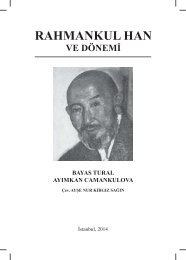THE SOVIET HISTORIOGRAPHY AND THE QUESTION OF KAZAKHSTAN’S HISTORY
SOVYET-TARIH-YAZICILIGI-ENG
SOVYET-TARIH-YAZICILIGI-ENG
Create successful ePaper yourself
Turn your PDF publications into a flip-book with our unique Google optimized e-Paper software.
136<br />
<strong>THE</strong> <strong>SOVIET</strong> <strong>HISTORIOGRAPHY</strong> <strong>AND</strong><br />
decades after the ‘glasnost’ campaign, following the Soviet demise in<br />
the republics and regions of the former Soviet territory. The re-evaluation<br />
and writing of history began to be reversed with the detailed<br />
interpretation about many forbidden subjects and figures in the history<br />
on the former Soviet domain. Academics and intellectuals specializing<br />
on the Soviet Union immediately realized these changes and began<br />
to work on the subject. 234<br />
Apart from his academic works, the personal life of historian Ermukhan<br />
Bekmakhanov mirrors the struggle of Kazaks under the Soviet regime.<br />
Bekmakhanov is one of the descendants of the Kazak Khans. He was<br />
born in the second year of WWI and spent his childhood during the<br />
early years of Soviet consolidation. During the era that the socialist<br />
ideology’s so-called class struggle eliminated almost whole “crème de<br />
la crème” of native intellectuals in the Soviet empire, Bekmakhanov<br />
experienced poverty and destitution as an orphan without a father. He<br />
went to Semey to continue his education and lost to hunger his mother<br />
and sister living in today’s Pavlodar during the 1931-1932 famine. He was<br />
not even able find the remains of his mother and sister.<br />
Historians and academics in Kazakstan today are contributing to<br />
the evaluation of many vital issues regarding the native Kazak history<br />
through studying the case of Ermukhan Bekmakhanov.<br />
- First, the reexamination of the historian who worked to analyze<br />
the struggle of Kenesary Khan; researchers are clarifying the distortion<br />
of a fact that the Kazaks did not accept the Russian over-lordship<br />
with their own will.<br />
- Secondly, as a result of the above-mentioned research, it became<br />
clear that there was a national leader in the nineteenth century in<br />
Kazak society and at least a considerable number of people followed<br />
and supported his leadership, and further, Kenesary Khan’s legacy<br />
intensified the national spiritual strength of the present-day society<br />
of Kazaks. Historian Bekmakhanov dealt with a potentially dangerous<br />
theme from the perspective of the Soviet ideology by revealing a reality<br />
to the light of day through his tireless research in tsarist archives,<br />
which were deeply hidden by the Soviet state.<br />
- The works of Bekmakhanov reveal the details of reactions and<br />
objections of the Kazaks to the tsarist Russian colonization policies<br />
and plight of the Kazaks in their ancestral homeland as a result of<br />
the occupation of their territory.<br />
- Studying this case is essential in bringing to daylight cases such<br />
as repentance from political mistakes, unfairness of the regime as<br />
234 Confino, Michael. ”The New Russian Historiography and the Old-Some Considerations,”<br />
History and Memory, Vol.21, Number 2, Fall/Winter 2009, pp.7-33.



